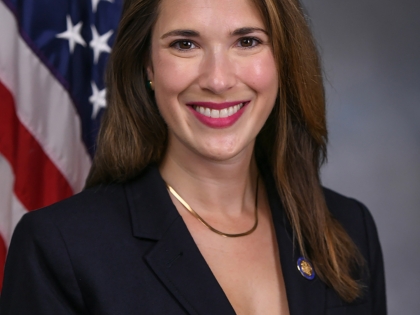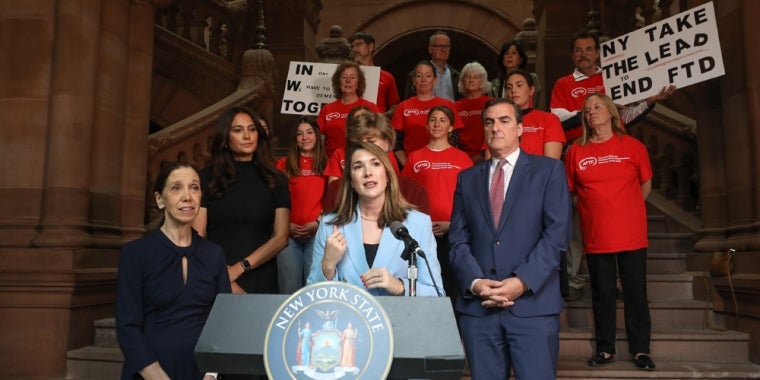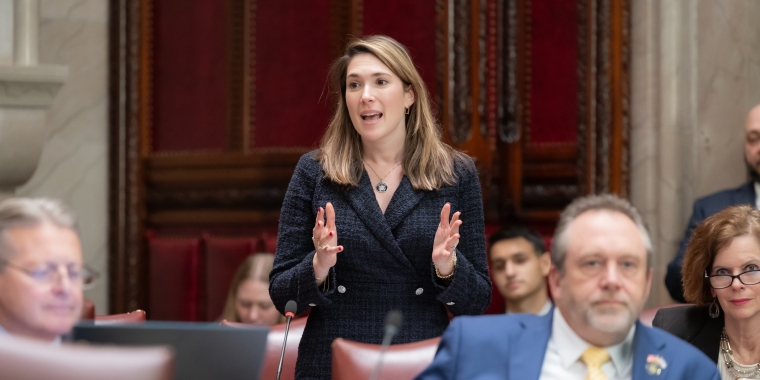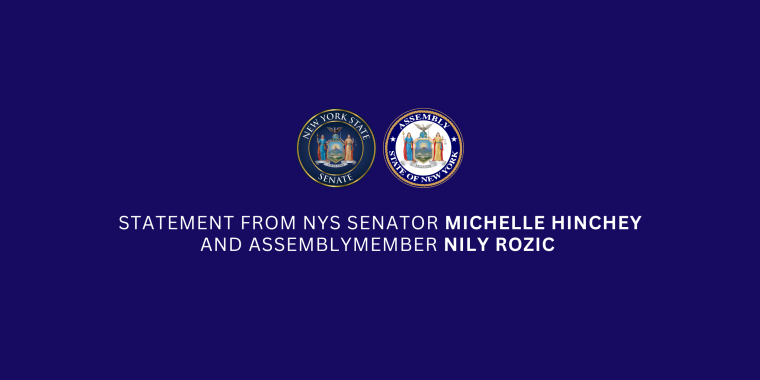
Hinchey, Paulin Legislation Establishes Country’s First State-Level Frontotemporal Degeneration Research Registry
October 20, 2025

ALBANY, NY – New York State Senator Michelle Hinchey and Assemblymember Amy Paulin today announced that Governor Kathy Hochul has signed legislation they sponsor to create a statewide research registry for Frontotemporal Degeneration (FTD)—a first-of-its-kind tool in New York that will track diagnoses, raise awareness of the disease in the medical community and move society closer to finding a cure for this form of dementia. The bill (S.598B/A.1985C) was unanimously passed by both legislative houses in the 2025 session.
Senator Michelle Hinchey is the daughter of the late and widely regarded Hudson Valley Congressman Maurice Hinchey, whose battle with FTD before his passing in 2017 drove the Senator to make FTD awareness an immediate priority when she was elected to the State Senate in 2020. Since then, Hinchey has become the Legislature’s leading voice on FTD, working to close gaps in care, sponsoring New York’s first resolution recognizing FTD Awareness Week, and inspiring similar action in other states, including a resolution championed in California by Emma Heming Willis. In total, 25 other states have adopted FTD Resolutions and Proclamations modeled after Senator Hinchey’s in New York—including four just this year in Montana, Oklahoma, Tennessee, and West Virginia.
Senator Michelle Hinchey said, “New York is now the first state in the country to establish a Frontotemporal Degeneration (FTD) Research Registry—a law inspired by my father’s battle with FTD and in honor of every family who has faced the heartbreak of a diagnosis. New York’s FTD Research Registry will help us understand the scale of the disease in New York and address the healthcare and knowledge gaps in our medical community that delay diagnosis and care. This is progress for a disease that can often feel hopeless, and New York’s law is lighting the way for other states and a national effort that will one day lead to a cure. I am profoundly grateful to Governor Hochul for signing our bill, Assemblymember Amy Paulin for her partnership, and to the Association for Frontotemporal Degeneration, Emma Heming Willis, and all of the families who fought to make this possible.”
FTD drew worldwide attention in 2023 when actor Bruce Willis was diagnosed—news that was shared courageously by his wife, Emma Heming Willis, and family. Since then, Heming Willis has become a leading advocate, raising awareness of the disease and working to strengthen support for families and caregivers, while advancing research toward a cure.
Emma Heming Willis said, “This registry makes New York the nation's leader in fighting FTD. For the first time, doctors, researchers, and public health professionals will know how often FTD is diagnosed, information that's essential in the race to find treatments and a cure. I hope we see laws like this across the country soon. Thank you, Governor Hochul, for making New York a light in the darkness for my family, and every family, fighting FTD.”
Assemblymember Amy Paulin, Chair of the Assembly Health Committee, said, “Frontotemporal Degeneration (FTD) is a debilitating disease and the most common form of dementia in people under 60. In order to find a cure for FTD, we must first understand it. I’m proud to have partnered with Senator Hinchey on this legislation, and I thank Governor Hochul for signing it into law so we can improve care and move closer to finding a cure.”
AFTD Director of Advocacy and Volunteer Engagement Meghan Buzby said, “The data collected under this bill will not only help with faster, more accurate diagnoses, but will also help quantify the burden of an FTD diagnosis on New York families—essential for making the case for increased public investment in caregiving and research resources. We are deeply grateful to Governor Hochul for signing this legislation into law. Her action, together with Senator Hinchey’s leadership, sets a model for other states to establish their own FTD registries and will galvanize these efforts nationwide.”
FTD is one of the least understood forms of dementia, often taking nearly four years to diagnose because its symptoms are commonly mistaken for psychiatric conditions, Alzheimer’s, or Parkinson’s. This lack of familiarity in the medical community not only delays care but can also create severe financial hardship for families, with the cost of FTD nearly double that of Alzheimer’s, as many patients and caregivers must leave the workforce during their prime earning years. With no focused data collection in place, awareness among doctors and the public remains low. Senator Hinchey’s bill will help change that by giving New York the tools to track FTD for the first time, improve care, and strengthen support for families.
The FTD Research Registry will establish a statewide system to track FTD diagnoses in New York by directing hospitals and healthcare providers to report cases to the State Department of Health (DOH). The DOH will then create the New York State Frontotemporal Degeneration Registry, an online portal where the public can access data on the incidence and prevalence of FTD and related epidemiological information. To guide this work, the DOH will consult with doctors, caregivers, researchers, and public health experts to develop the registry.
For guidance regarding an FTD diagnosis and connections to social workers, contact the Association for Frontotemporal Degeneration (AFTD) Helpline at 1-866-507-7222 or email info@theaftd.org. Other resources and ways to get involved include:
- Support Groups: Find nearby resources for patients and caregivers
- Get in touch with a genetic counselor to learn about FTD and Genetic Testing
- Find ways to participate in FTD research
- Become an AFTD Advocate to raise awareness and support policy solutions
###
related legislation
Share this Article or Press Release
Newsroom
Go to Newsroom


